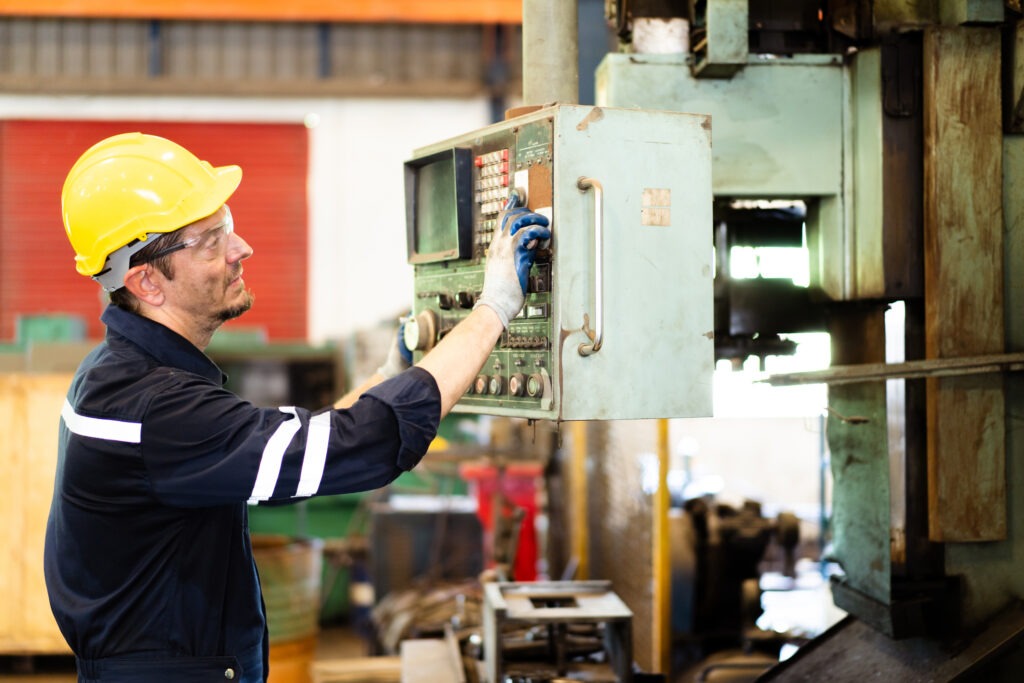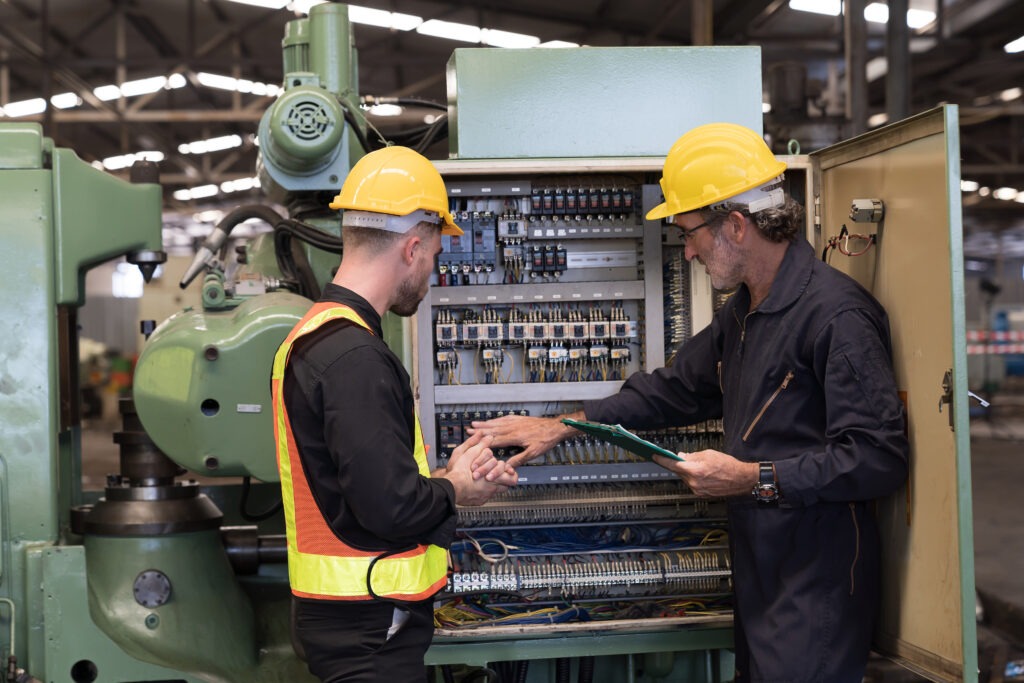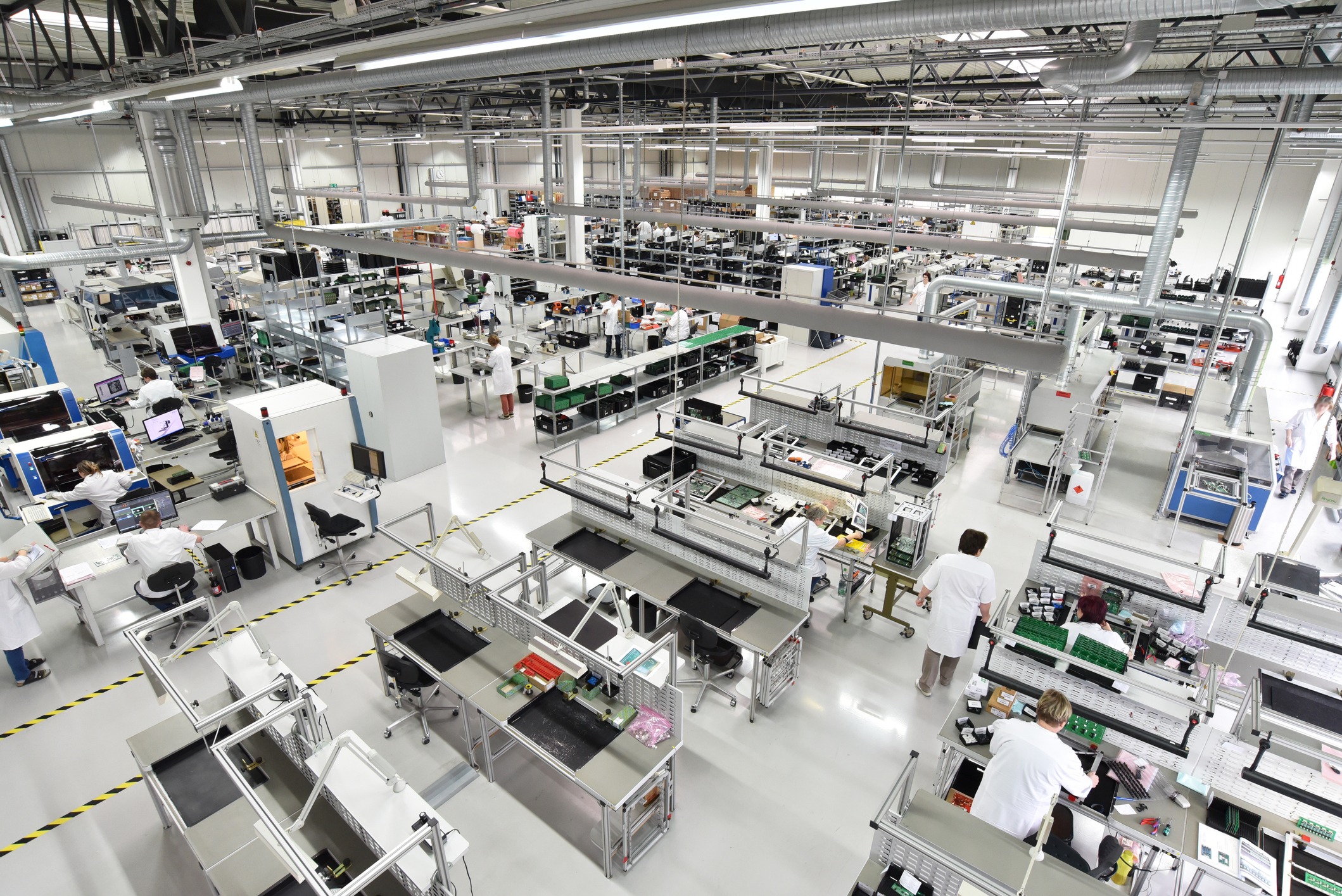What qualifications are required for temporary work in production?
Temporary work in production is very important, as the shortage of skilled labour is real, even in this sector. But what qualifications are required for temporary work in production? Technical skills are necessary, but so are soft skills. These can increase your chances of finding an attractive job, as can the further training opportunities that temporary work offers. In this article, we take a look at all the relevant qualifications and everything to do with temporary work in production.
Table of contents
- What qualifications are required for temporary work in production?
- Why temporary work in production and logistics?
- Why are qualifications important for temporary workers in production?
- What technical qualifications do temporary workers need in production?
- What soft skills should temporary workers in production have?
- Do the requirements for temporary workers vary depending on the sector and area of work?
- What role do training and professional experience play in production?
- How does a temporary employment agency help with training?
- What are the advantages of temporary work in production - for companies and employees?
- Which specific qualifications increase your chances in production?
- What areas of activity are there for temporary workers in production?
- Zeitarbeit International - Your partner in production
- FAQ
Estimated reading time: 15 minutes
What is temporary work in production?
In the manufacturing industry, temporary work offers companies temporary labour provided by temporary employment agencies. Such cooperation is sometimes referred to as "employee leasing", which means that a company can flexibly deploy staff for production. A temporary employment agency (lender) hires a temporary worker with an employment contract and the company where the work is carried out (hirer) requests their labour in the production department. This enables German companies to cope with order peaks and seasonal fluctuations without having to immediately enter into long-term employment relationships.
Why temporary work in production and logistics?
Temporary work in the area of production and logistics is particularly in demand, as temporary helpers are also needed at short notice. These are needed to ensure ongoing production operations. This allows the industry to react flexibly to fluctuations in demand, while temporary workers also benefit from the variety of assignments in different companies and fields of work. Almost all sectors, such as the automotive industry, the chemical industry and electronics, rely on temporary workers to increase the flexibility of their production.
Why are qualifications important for temporary workers in production?
Well-trained specialists are a key factor in the modern world of work, and this also applies to temporary staffing in production. Companies can achieve their production targets by utilising qualified temporary workers. They can then work productively without long familiarisation periods. They have the right experience to pick up on new technological processes and adapt to changing dynamics on the production line as temporary workers. More than ever, skilled workers play a key role when it comes to ensuring efficient and high-quality production in the industry internally. Ignorance is not a good thing; it can lead to quality defects or even safety risks.
Conversely, well-trained employees reduce the error rate and the risk of accidents in production. Experienced temporary workers also reduce the amount of training and supervision required, which saves time and money. The more highly qualified the temporary worker is, the more smoothly they can be deployed in the company.

What technical qualifications do temporary workers need in production?
Depending on the area of work, production employees must have certain technical skills. Below are some of the qualifications that are often required in production:
- The Forklift licence (forklift licence): Driving licence to operate forklift trucks, very important for warehouse and material transport.
- Machine and system operation: The ability to operate production machines and a basic technical understanding of how they work.
- Quality control and maintenance: Basic knowledge to inspect products and perform minor maintenance tasks or troubleshooting.
- Manual skills: handling tools and equipment, for example when assembling parts or adjusting machines.
The exact qualification requirements also depend on the industry. In the metal and electrical industry, specialised skills in handling machines and drawing technical designs are often required. With a sound technical foundation, it will be easier to enter production and with this expertise you will become a sought-after employee.
What soft skills should temporary workers in production have?
In addition to sound knowledge, soft skills are also very important in production. This is especially true in a team of permanent and temporary employees. Important qualities are, for example, flexibility, the ability to work in a team and strong communication skills. It is important that you can adapt quickly to existing processes and are ready to react to changing requirements. As many production companies operate a multi-shift system, a willingness to work shifts is an additional requirement.
Punctuality and reliability are just as important. Your bosses and colleagues need to know that they can rely on you at all times. A willingness to learn and the ability to work under pressure are also an advantage, because as a temporary worker in production you will have to move back and forth frequently and get used to new places. These are precisely the "soft skills" that are needed in production in order to familiarise yourself well and promote a healthy working environment. This is because there are many changing requirements in temporary production work.
Do the requirements for temporary workers vary depending on the sector and area of work?
The requirements can vary considerably depending on the industry and application. Each industry has its own processes and rules. With Food and in the pharmaceutical industry, for example, you can expect particularly high hygiene requirements. You should also expect that a health certificate will be required and that cleaning and quality standards must be particularly strict. In the metal and automotive sectors, on the other hand, you can expect high demands on your technical knowledge. Sometimes you will need special qualifications such as a welding licence or experience with CNC machines.
For the area Warehouse & Logistics a forklift licence and experience with merchandise management systems are advantageous. These examples illustrate the diversity of the areas of activity of temporary workers in production as well as the different qualifications required, depending on the company in question. A competent personnel service provider takes these differences into account and searches specifically for temporary workers whose profiles match the respective industry.
What training opportunities does temporary work in production offer?
Employees in temporary employment in production often have access to extensive further training programmes. Many temporary employment agencies offer internal qualification measures, such as the acquisition of a forklift licence, training in machine and system operation as well as special training to promote soft skills in production, such as teamwork or communication. These training programmes improve your chances of more challenging assignments and sustainable career prospects.
What role do training and professional experience play in production?
Completed vocational training can be an advantage in many production jobs, but is not always essential. Many production assistants start in the industry through temporary work, even without a formal qualification. There are many helper positions available that do not require extensive training and are suitable for unskilled personnel. However, relevant qualifications such as machine and plant operator, mechanic or electrician significantly increase the chances of more demanding tasks and a higher classification. Work experience is also crucial. For example, if you have already worked in similar fields of activity, workers can contribute their knowledge and are often more quickly deployable.
While career starters initially take on simpler tasks, it is often experienced specialists who carry out more responsible activities. However, temporary work in production offers career starters the opportunity to gradually gain practical experience and expand their qualifications.
How does a temporary employment agency help with training?
Good temporary employment agencies support their employees in acquiring and expanding the necessary qualifications. The recruitment agency carefully checks what qualifications and diplomas you have and compares these with the requirements of the client company. For example, if you lack a registered forklift licence, the temporary employment agency can recommend or organise suitable training. Some recruitment agencies also offer internal training courses or work with external training partners.
In addition, reputable temporary employment agencies guarantee that you will receive all legally required training on occupational health and safety before you start at the client company. For you as an employee, this means that you will not be thrown in at the deep end without preparation. You can rest assured that you will be well prepared for your assignment with the client.
What are the advantages of temporary work in production - for companies and employees?
Temporary work in production not only provides short-term relief in terms of personnel, but is also a real solution in terms of efficiency, both for companies looking for qualified support and for employees who want to utilise their skills in a targeted manner.
This has the following advantages for companies:
- Targeted staffing according to qualifications: Temporary employment agencies place applicants with suitable qualifications, certificates or further training - for example in machine operation, warehouse logistics or CNC technology.
- Minimisation of downtimes: Qualified temporary workers require less familiarisation time, which reduces downtime in production.
- Flexible response to order peaks: Temporary specialists help to bridge bottlenecks without entering into long-term commitments.
- Cost control: Fixed costs become variable costs - companies only pay for hours actually worked.
- Relief for permanent staff: Temporary workers with experience and technical qualifications reduce the pressure on permanent teams.
- Less risk: The temporary employment agency assumes employer obligations such as continued payment of wages and social security contributions.
Employees benefit from temporary work production for these reasons:
- Wide range of applications: If you have a welding certificate, hygiene training or IT skills, it is easier to find suitable jobs.
- Chance of a takeover: Many companies take on well-trained temporary workers as permanent employees - expertise is often the door opener.
- Targeted further development: Temporary employment agencies often offer training courses to improve existing skills or acquire new ones.
- Fast career entry: Even without a completed apprenticeship, sought-after partial qualifications enable entry into production.
- Broad practical experience: Various assignments promote flexibility, routine and career opportunities - ideal for motivated specialists.
This makes temporary work in production a real model for success: companies gain skilled workers who can be deployed immediately - and qualified employees find flexible ways into a professionally stable future.
Which specific qualifications increase your chances in production?
In-depth technical qualifications are of particular value in temporary work in production. A forklift licence (industrial truck licence) qualifies you to safely operate forklifts and other industrial trucks for transport and logistics tasks. With your knowledge of machine and system operation, you will be able to set up and operate systems, carry out minor maintenance and rectify faults independently.
With expertise in the field of CNC technology you will be able to operate and programme computer-controlled machines that are used for precise machining processes such as milling or turning. Control technology (e.g. PLC) includes knowledge of setting up and programming programmable logic controllers, which are indispensable for the automation of complex production processes.

Production qualifications - robotics and more
With a qualification in robotics, employees are able to operate and maintain industrial robots and rectify minor faults themselves. With certifications in quality control and metrology, workers can accurately inspect production parts and use precision measuring instruments (such as calipers or micrometers) to ensure compliance with quality standards. In addition, knowledge of welding and soldering processes expands their range of applications in metal construction and manual dexterity facilitates the assembly and precise adjustment of mechanical assemblies. Knowledge of basic electrical principles will enable you to carry out minor electrical maintenance and assembly work safely. In addition, further training in materials management and warehouse logistics will enable you to professionally manage stock levels and optimise the internal management of material flows.
Experience in lean management and process optimisation helps workers to analyse and continuously improve production processes. Hygiene training will qualify you for work in sensitive areas such as food or pharmaceutical production, and IT skills will make it easier for you to work with digital control and merchandise management systems.
What areas of activity are there for temporary workers in production?
Temporary workers can be deployed in numerous ways in production companies. Depending on your qualifications, you can either take on simple helper tasks or more demanding specialised work. Examples of typical fields of work in production include
- Assembly and production: Assembly of components, operation of production lines, labour in series production.
- Machine operation: Equipping and monitoring machines and systems, e.g. in plastics processing or metalworking.
- Packaging and warehouse: Packing goods, carrying out quality control, transporting goods within the company (often using a forklift truck) and picking orders.
- Maintenance and servicing: Supporting technicians in the maintenance of systems, simple repair work or cleaning work on machines.
- Specialised activities: In some industries, special skills may be required - for example, welding work in metal construction, laboratory assistance in chemistry or quality testing in food production.
These examples clearly show that temporary workers can be deployed in almost all areas of production, from unskilled labour to qualified specialists. The specific tasks vary depending on the needs of the client company. Temporary work in the production sector offers a suitable challenge for everyone due to the variety of fields of activity.
Robotics and automation industry
What speaks for itself is that many areas of production are growing. According to data from Statista the robotics and automation industry reached a turnover of around USD 15.7 billion in 2023. An impressive doubling that took place within a decade. This rapid development illustrates how important new technologies and machine and system operation have become. Accordingly, this also applies to temporary work in production. Temporary workers with such skills thus secure significantly better opportunities for future-proof and high-quality work assignments.
Conclusion
In temporary production work, it's not just a forklift licence or technical know-how that counts. Soft skills, the ability to work in a team and flexibility are just as important. Temporary employment agencies ensure that companies benefit from qualified specialists who can be deployed at short notice to fill staffing gaps or bottlenecks. Employees see temporary work as an opportunity to gain experience in various areas and enter the labour market. The better the match between qualifications and motivation, the more successful the assignment in production will be.
Zeitarbeit International - Your partner in production
Zeitarbeit International has more than 35 years of experience in supporting companies with qualified personnel for production and industry. We can provide you with production assistants and skilled workers from Eastern Europe who have all the necessary qualifications.
With Zeitarbeit International at your side, you benefit from a strong partner who takes care of recruitment, approvals and all organisational matters so that you can concentrate fully on your business. If you have any questions about temporary staffing or need personnel from Eastern Europe who are flexible and familiar with all new technologies, have technical understanding and are able to adapt to changing requirements - simply contact us by phone or using the enquiry form.
Related topics:

FAQ
No, formal vocational training is not absolutely necessary for many jobs as a helper. Even without a qualification, it is possible to start in simple production jobs and gain experience through temporary work. However, specialised training (e.g. as a machine operator or mechanic) increases the chances of higher-skilled and better-paid assignments.
The forklift licence is particularly in demand, as forklifts are used in many production facilities. Depending on the industry, other certificates may also be useful, such as a welding certificate for the metal industry or hygiene training in food production. In general, additional qualifications and completed safety briefings show the employer that you are versatile and well prepared.
Can I work in production as a career changer without experience?
Yes, that is possible. Even career changers often find their way into production through temporary employment agencies. Direct on-the-job training for new employees is common in many companies. If you have a good work ethic and a willingness to learn, you can quickly familiarise yourself with the job even without any previous experience.
The induction programme for temporary workers on site is usually similar to that for permanent new recruits. This means that at the beginning you will receive an introduction to your tasks, safety regulations and processes. You will often be assigned an experienced colleague who will demonstrate the tasks to you. If anything is unclear, you should actively ask questions. Both the client company and the temporary employment agency will be on hand to help you.
Yes, it is quite possible that the host company will take you on. If a company is satisfied with your work and has a need for staff, you will often be offered a permanent position. Demonstrate reliability and commitment - this will increase your chances of being offered a permanent position outside of temporary work.


